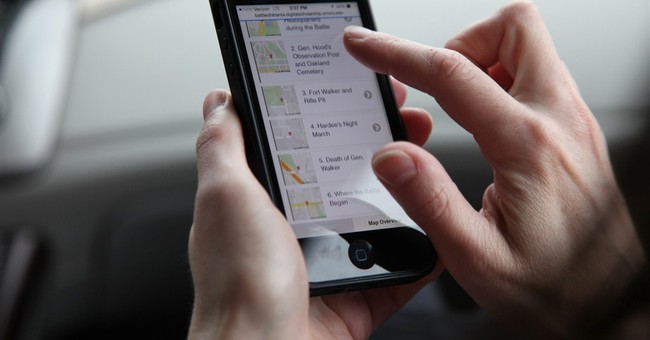
Posted on 07/26/2014 4:32:28 PM PDT by Kaslin

A bill to permit the practice of "unlocking" a cell phone--meaning a consumer could use the same phone on different carriers--was passed by the House of Representatives yesterday and is expected to be signed into law by President Obama. The Unlocking Consumer Choice and Wireless Competition Act passed with wide bipartisan support and was sponsored by Rep. Bob Goodlatte (R-VA) in the House and Sen. Patrick Leahy (D-VT) in the Senate.
Unlocking a phone without the wireless carrier's permission was legal in the U.S. until a 2012 decision by the U.S. Copyright Office. That decision resulted in a grassroots campaign to fight for the legality of unlocking a phone. A petition on the website We The People garnered over 114,000 signatures in support.
The White House released a statement praising Congress for passing the bill, saying that it will help to restore "basic consumer freedom."
I applaud Members of Congress for passing the Unlocking Consumer Choice and Wireless Competition Act. Last year, in response to a “We the People” petition from consumers across our country, my Administration called for allowing Americans to use their phones or mobile devices on any network they choose. We laid out steps the FCC, industry, and Congress should take to ensure copyright law does not undermine wireless competition, and worked with wireless carriers to reach a voluntary agreement that helps restore this basic consumer freedom. The bill Congress passed today is another step toward giving ordinary Americans more flexibility and choice, so that they can find a cell phone carrier that meets their needs and their budget. I commend Chairmen Leahy and Goodlatte, and Ranking Members Grassley and Conyers for their leadership on this important consumer issue and look forward to signing this bill into law.
Kudos to Congress for finally getting this one right. More consumer choices is always a good thing, and carriers have no right to refuse to unlock phones even after a contract has ended.
Almost impossible to believe the Feds did something good for the people.
‘bout time.
very much so
I don’t quite grasp what they have done and how it helps the people. There has got to be some kind of lawyer set traps hidden in the language.
>>Almost impossible to believe the Feds did something good for the people.<<
I have been sending my old PDAs to my relatives in Mexico for years. All of them have been put to use immediately by various carriers with no problem.
They think it strange we can’t take our phone from carrier to carrier up here.
Ironic, eh?
(In case the phone is ever lost or stolen, so they can render it worthless)
Just curious.
My cheap phone and my no-contract service is very inexpensive, but if it was ever stolen, I could have the unused service balance transferred, and the phone would be rendered worthless to a thief.
I can see wanting to be able to sell or donate an old but still good higher end phone, and also why one might want to change service providers at will.
But doesn't this also make it easier for thieves to profit?
Does it mean AT&T still has to honor the warranty?
I ask, because I don’t know how the higher end consumer device warranties work.
You probably have to call the NSA to get them to switch it over.
Be forewarned: there is almost ALWAYS a deductible they don’t mention when you sign up for it.
Stay tuned....Obama plans to unblock pens next
I didn’t realize the Feds outlawed the act of unlocking a phone in 2012. Does this bill do anything besides undo that FTC rule?
Your phone’s handset registers it’s “hardware” (usually referred to as an IMEI for most phones) every time it authenticates with a network (aka you turn it on, travel, etc). The phone company knows that IMEI belongs to you.
When someone steals your phone, you should immediately call your provider. They will basically “flag” that IMEI as stolen. Options at this point for the company range from sending its location data to the police, all the way to (most likely) simply not allowing that phone to register. In other words, turning it into a brick. Or, in your terminology, activating a kill-switch.
This it the case for all cellular phones from the fanciest smart phone, to the dumbest burner phone (which I proudly carry).
But ONLY if you stay within the same system , GSM or CDMA
TMobile is less expensive than ATT.
Oh goodie. America is burning but I can change cell phone carriers.
It's rare to get a such a concise answer to an IT question.Bless you! So the anti-theft deterrent is the owner maintaining records of the device's IMEI code, no matter which service provider(s) the device owner chooses to select.Correct?
On the flip side, can service providers also detect the IMEI codes of devices that fraudulently access their wireless business services?
Because I was recently made aware of an “app” that allowed any laptop to become a “wireless hotspot”.
That seemed to me to be theft of services, since while it was proposed as an emergency “work around” for a sudden loss of local wireless Internet access due to unexplained equipment failure,it occurred to me that it could easily be used to get “free service forever” on somebody else’s dime.
Disclaimer: Opinions posted on Free Republic are those of the individual posters and do not necessarily represent the opinion of Free Republic or its management. All materials posted herein are protected by copyright law and the exemption for fair use of copyrighted works.